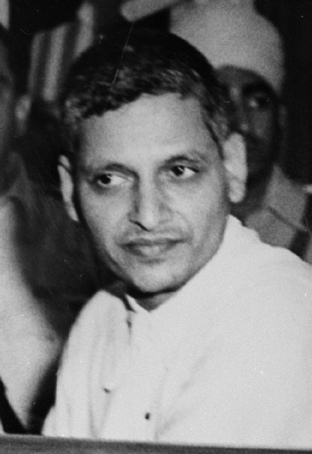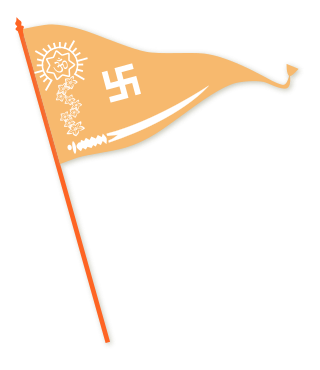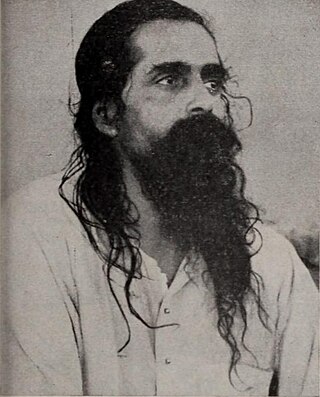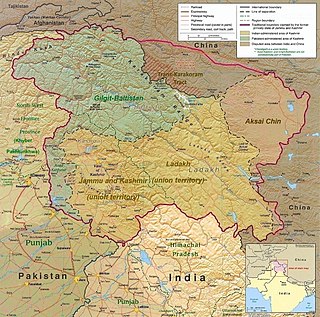
Ramachandra Nathuram Vinayak Godse was the assassin of Mahatma Gandhi. He was a Hindu nationalist from Maharashtra who shot Gandhi in the chest three times at point blank range at a multi-faith prayer meeting in Birla House in New Delhi on 30 January 1948.

The Rashtriya Swayamsevak Sangh is an Indian right-wing, Hindu nationalist volunteer paramilitary organisation. It is the progenitor and leader of a large body of organisations called the Sangh Parivar, which has developed a presence in all facets of Indian society and includes the Bharatiya Janata Party, the ruling political party under the Prime Minister Narendra Modi. The present Sarsanghchalak of the RSS is Mohan Bhagwat.
Hindutva is a political ideology encompassing the cultural justification of Hindu nationalism. The political ideology was formulated by Vinayak Damodar Savarkar in 1922. It is used by the Rashtriya Swayamsevak Sangh (RSS), the Vishva Hindu Parishad (VHP), the Bharatiya Janata Party (BJP) and other organisations, collectively called the Sangh Parivar.

The Bharatiya Janata Party is a political party in India and one of the two major Indian political parties alongside the Indian National Congress. Since 2014, it has been the ruling political party in India under incumbent Prime Minister Narendra Modi. The BJP is aligned with right-wing politics, and its policies adhere to Hindutva, a Hindu nationalist ideology. It has close ideological and organisational links to the Rashtriya Swayamsevak Sangh (RSS). As of March 2023, it is the country's biggest political party in terms of representation in the Parliament of India as well as state legislatures.

Vinayak Damodar Savarkar, Marathi pronunciation: [ʋinaːjək saːʋəɾkəɾ]; 28 May 1883 – 26 February 1966) was an Indian politician, activist, and writer. Savarkar developed the Hindu nationalist political ideology of Hindutva while imprisoned at Ratnagiri in 1922. He was a leading figure in the Hindu Mahasabha. He started using the honorific prefix Veer ("brave") since he wrote his autobiography. Savarkar joined the Hindu Mahasabha and popularized the term Hindutva (Hinduness), to create a collective "Hindu" identity as an essence of Bharat (India). Savarkar was an atheist.

The Bharatiya Jana Sangh (abbreviated asBJS or JS, short name: Jan Sangh, was an Indian right wing political party that existed from 1951 to 1977 and was the political arm of Rashtriya Swayamsevak Sangh, a Hindu nationalist volunteer organisation. In 1977, it merged with several other left, centre and right parties opposed to the Indian National Congress and formed the Janata Party.

Keshav Baliram Hedgewar, also known by his moniker Doctorji, was an Indian physician and the founder of the Rashtriya Swayamsevak Sangh (RSS). Hedgewar founded the RSS in Nagpur in 1925, based on the ideology of Hindutva with the intention of creating a Hindu Rashtra.

Akhil Bharat Hindu Mahasabha is a Hindu nationalist political party in India.

Madhav Sadashivrao Golwalkar, popularly known as Guruji was the second Sarsanghchalak ("Chief") of the Rashtriya Swayamsevak Sangh (RSS). Golwalkar is considered one of the most influential and prominent figures among Rashtriya Swayamsevak Sangh by his followers.

The Kashmir conflict is a territorial conflict over the Kashmir region, primarily between India and Pakistan, and also between China and India in the northeastern portion of the region. The conflict started after the partition of India in 1947 as both India and Pakistan claimed the entirety of the former princely state of Jammu and Kashmir. It is a dispute over the region that escalated into three wars between India and Pakistan and several other armed skirmishes. India controls approximately 55% of the land area of the region that includes Jammu, the Kashmir Valley, most of Ladakh, the Siachen Glacier, and 70% of its population; Pakistan controls approximately 30% of the land area that includes Azad Kashmir and Gilgit-Baltistan; and China controls the remaining 15% of the land area that includes the Aksai Chin region, the mostly uninhabited Trans-Karakoram Tract, and part of the Demchok sector.

Article 370 of the Indian constitution gave special status to Jammu and Kashmir, a region located in the northern part of the Indian subcontinent and part of the larger region of Kashmir which has been the subject of a dispute between India, Pakistan and China since 1947. Jammu and Kashmir was administered by India as a state from 17 November 1952 to 31 October 2019, and Article 370 conferred on it the power to have a separate constitution, a state flag, and autonomy of internal administration.

Khurshid Hasan Khurshid (Urdu: خورشید حسن خورشید) pronounced [xu:r'ʃi:d ɦəsəɳ xu:r'ʃi:d], popularly known by his acronym, K. H. Khurshid, was the Private Secretary of Muhammad Ali Jinnah, the first Governor-General of Pakistan. He served Jinnah from 1944 until his death in 1948. Khurshid was the first elected President of Azad Jammu and Kashmir from 1959 to 1964. He was also the instigator of the Constitution of Azad Kashmir.

Badruddin Tyabji was an Indian lawyer, activist, and politician during the British Raj. Tyabji was the first Indian to practice as a barrister of the High Court of Bombay who served as the third President of the Indian National Congress. He was one of the founding member and first Muslim president of Indian National Congress. He founded the Anjuman-i-Islam College in Bombay in 1874. It started with one school and today it has more than eighty institutions from pre-primary schools to graduate and postgraduate level. Tyabji is often referred to as one of the most prominent members of Tyabji family.
Hindu Revolution is a term in Hindu nationalism referring to a sociopolitical movement aiming to overthrow untouchability and casteism to unified social and political community to create the foundations of a modern nation.
Hindu nationalism has been collectively referred to as the expression of social and political thought, based on the native spiritual and cultural traditions of the Indian subcontinent. "Hindu nationalism" is a simplistic translation of हिन्दू राष्ट्रवाद. It is better described as "Hindu polity".
LeftWord Books is a New Delhi-based publisher that seeks to reflect the views of the Left in India and South Asia. Its Managing Director is Prakash Karat, the former General Secretary of the Communist Party of India (Marxist), or CPI(M). The Chief Editor is Vijay Prashad and the Managing Editor is the actor-publisher Sudhanva Deshpande.
Mauli Chandra Sharma was a senior Indian politician, originally of the Indian National Congress. He was a founding member of the Bharatiya Jana Sangh, serving as its Vice-President and President, before being forced out by the Rashtriya Swayamsevak Sangh activists in the party in 1954.
Badruddin Faiz Tyabji' (1907-1995) was a senior Indian Civil Service officer, who served as Vice-Chancellor of the Aligarh Muslim University, from 1962 to 1965. While serving as a diplomat in 1948, he had undertaken the task of starting the Embassy of India, Brussels. He also served as Indian ambassador in Jakarta, Tehran, Bonn and Tokyo.

The Tyabji family, also known as Tyabji-Hydari,Tyabji-Fyzee, and Tyabji-Futehally family, consists of Mullah Tyab Ali and his descendants. The Tyabji family has gained fame for its exhaustive involvement in India's independence movement with individuals being prominent politicians, diplomats, academics, scientists, activists, and athletes. Other members gained prominence for their roles in India's Navy and Air Force and contribution to Indian film and fine art. Individuals within the Tyabji family belong to the Indian royal families of the Nizam of Hyderabad, the Nawab of Bengal, Raja of Wanaparthy, and the Nawab of Janjira. "The Tagores and the Tyabjis are the rarities for India and they are her friends" - Mahatma Gandhi.

Kamila Tyabji was an Indian philanthropist and lawyer.













